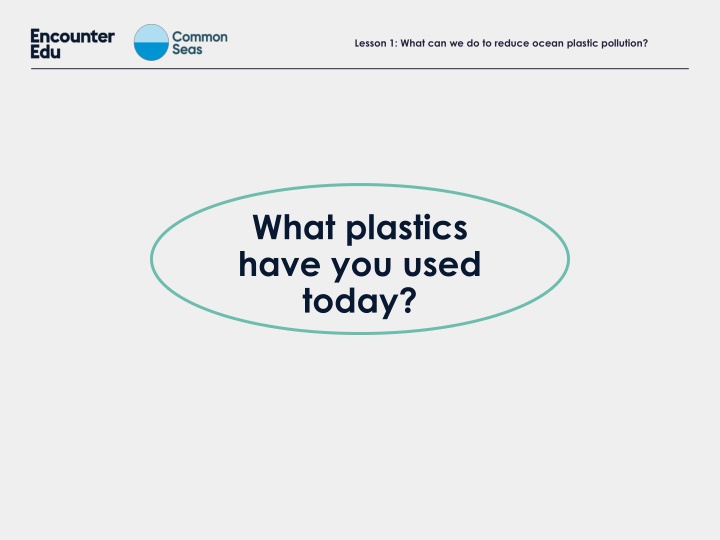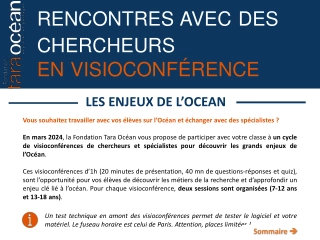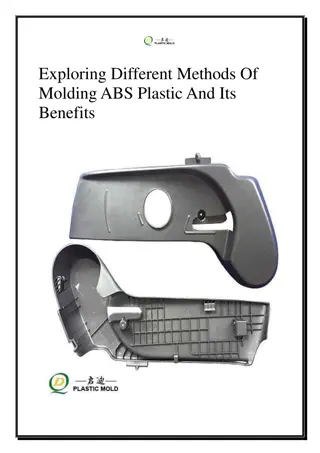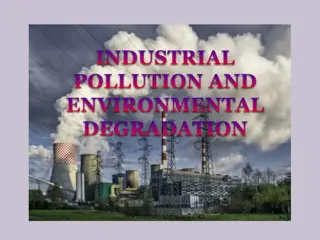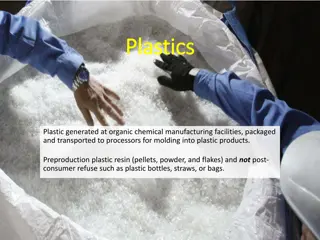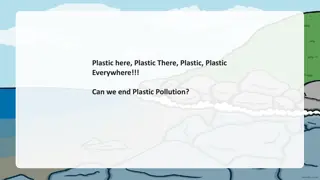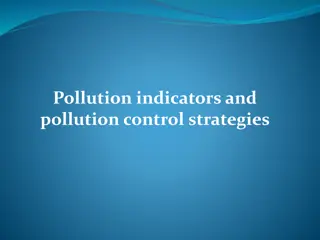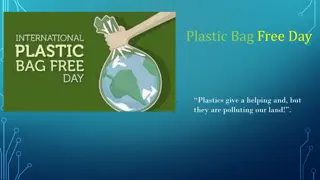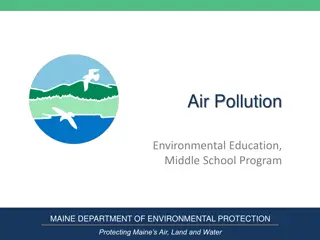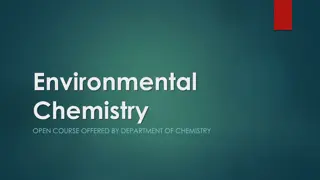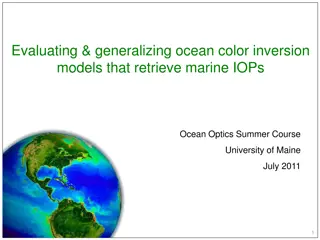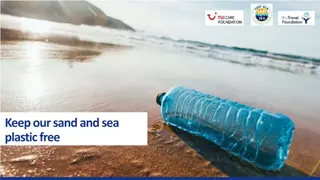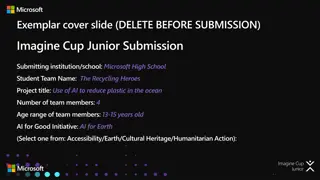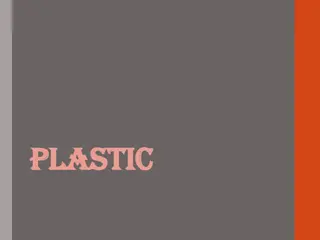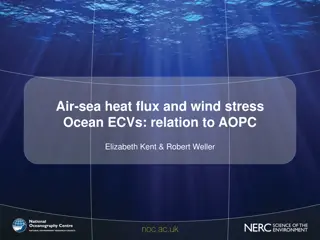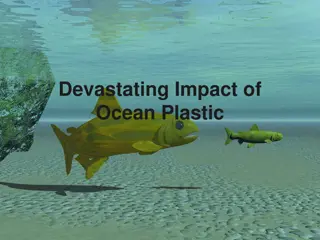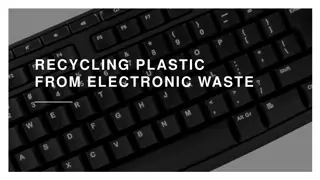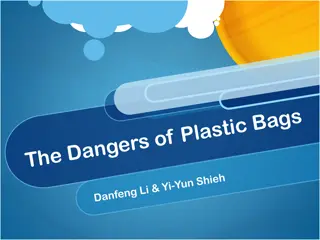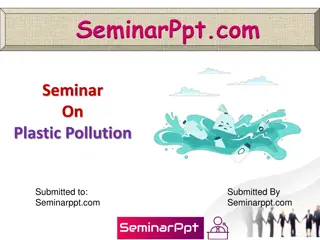Reducing Ocean Plastic Pollution: Key Strategies and Solutions
Plastic pollution in the oceans is a significant environmental challenge. This lesson delves into the causes of ocean plastic pollution, the impact of plastics on marine ecosystems, and practical measures we can take to mitigate this issue. From discussing the uses of plastics to exploring recycling effectiveness, this informative session provides valuable insights into safeguarding our oceans. Join us in understanding the importance of reducing plastic waste and adopting sustainable practices for a cleaner marine environment.
Download Presentation

Please find below an Image/Link to download the presentation.
The content on the website is provided AS IS for your information and personal use only. It may not be sold, licensed, or shared on other websites without obtaining consent from the author.If you encounter any issues during the download, it is possible that the publisher has removed the file from their server.
You are allowed to download the files provided on this website for personal or commercial use, subject to the condition that they are used lawfully. All files are the property of their respective owners.
The content on the website is provided AS IS for your information and personal use only. It may not be sold, licensed, or shared on other websites without obtaining consent from the author.
E N D
Presentation Transcript
Lesson 1: What can we do to reduce ocean plastic pollution? What plastics have you used today?
Ocean Plastics Design and Technology | 11-14 Lesson 1 What can we do to reduce ocean plastic pollution?
Lesson 1: What can we do to reduce ocean plastic pollution? 01 02 Ocean Plastics Design and Technology What can we do to reduce ocean plastic pollution? Why should we recycle? 03 04 How do we reduce reuse and refuse plastic products? Should we repair? 05 06 Can redesigning products help? Design Task
Lesson 1: What can we do to reduce ocean plastic pollution? Learning objectives 1. List the uses of plastics 2. Discuss the importance of plastic 3. Define the 6 Rs 4. Evaluate the effectiveness of recycling in the UK 5. Describe the life cycle of plastic
Lesson 1: What can we do to reduce ocean plastic pollution? Plastic Invented in late 19thcentury, production exponentially grew in the 1950s. Plastic revolutionised the world. It added comfort, convenience and safety to our lives. Arguably the industry it affected the most was on healthcare. Plastic (the umbrella term) has many key properties notably it being lightweight, robust and most importantly hygienic.
Lesson 1: What can we do to reduce ocean plastic pollution? Key plastic products List other important plastic products Food containers Cars Medical supplies
Lesson 1: What can we do to reduce ocean plastic pollution? It is not so much the making of plastic that is the issue, it is the disposing of plastic that has caused the environmental issues.
Lesson 1: What can we do to reduce ocean plastic pollution? True or false It has been estimated that nearly 5 billion plastic straws are thrown away in England each year TRUE FALSE
Lesson 1: What can we do to reduce ocean plastic pollution? True or false It has been estimated that nearly 5 billion plastic straws are thrown away in England each year TRUE
Lesson 1: What can we do to reduce ocean plastic pollution? True or false 25% of Europe s plastics are used once and then thrown away TRUE FALSE
Lesson 1: What can we do to reduce ocean plastic pollution? True or false 25% of Europe s plastics are used once and then thrown away 70% is used once FALSE 11
Lesson 1: What can we do to reduce ocean plastic pollution? True or false We produce over 300 million tonnes a year of plastic TRUE FALSE
Lesson 1: What can we do to reduce ocean plastic pollution? True or false We produce over 300 million tonnes a year of plastic TRUE
Lesson 1: What can we do to reduce ocean plastic pollution? True or false 30% of plastic produced is designed for single use TRUE FALSE
Lesson 1: What can we do to reduce ocean plastic pollution? True or false 30% of plastic produced is designed for single use 50% is designed for single use FALSE 15
Lesson 1: What can we do to reduce ocean plastic pollution? True or false A plastic bottle will take more than 450 years to decompose TRUE FALSE
Lesson 1: What can we do to reduce ocean plastic pollution? True or false A plastic bottle will take more than 450 years to decompose TRUE
Lesson 1: What can we do to reduce ocean plastic pollution? True or false Symbols like this mean it is recyclable TRUE FALSE
Lesson 1: What can we do to reduce ocean plastic pollution? True or false Symbols like this mean it is recyclable This tells us the type of plastic. Not that it is recyclable. FALSE 19
Lesson 1: What can we do to reduce ocean plastic pollution? True or false Approximately 13 billion plastic bottles are used each year in the UK TRUE FALSE
Lesson 1: What can we do to reduce ocean plastic pollution? True or false Approximately 13 billion plastic bottles are used each year in the UK TRUE
Lesson 1: What can we do to reduce ocean plastic pollution? True or false Less than half of plastic bottles are recycled in the UK TRUE FALSE
Lesson 1: What can we do to reduce ocean plastic pollution? True or false Less than half of plastic bottles are recycled in the UK More 57% FALSE 23
Lesson 1: What can we do to reduce ocean plastic pollution? True or false It is estimated that 8.3 billion tonnes of plastic has been created TRUE FALSE
Lesson 1: What can we do to reduce ocean plastic pollution? True or false It is estimated that 8.3 billion tonnes of plastic has been created TRUE
Lesson 1: What can we do to reduce ocean plastic pollution? True or false 15% of all the plastic made has been recycled TRUE FALSE
Lesson 1: What can we do to reduce ocean plastic pollution? True or false 15% of all the plastic made has been recycled Less than 10% is recycled FALSE 27
Lesson 1: What can we do to reduce ocean plastic pollution? Waste Hierarchy
Lesson 1: What can we do to reduce ocean plastic pollution? Definitions of 6 Rs Match up the key words with the definition a. Take an existing product that has become waste and use the material or parts of it for another purpose, without processing it Recycle b. Don t use a material or buy a product if you think you don t need it or if it s unsustainable Reuse c. When a product breaks down or doesn t function properly, try to fix it rather than throw it away Reduce d. Take an existing product that has become waste and reprocess the material to use in a new product Refuse e. Recreate a product to be more environmentally friendly and still meet its function Repair Redesign f. Minimise the amount of energy and materials you use
Lesson 1: What can we do to reduce ocean plastic pollution? Answers d. Take an existing product that has become waste and reprocess the material to use in a new product Recycle a. Take an existing product that has become waste and use the material or parts of it for another purpose, without processing it Reuse f. Minimise the amount of energy and materials you use Reduce b. Don t use a material or buy a product if you think you don t need it or if it s unsustainable Refuse c. When a product breaks down or doesn t function properly, try to fix it rather than throw it away Repair Redesign e. Recreate a product to be more environmentally friendly and still meet its function
Lesson 1: What can we do to reduce ocean plastic pollution? Is recycling rubbish? Complete Student Sheet 1b: Is recycling rubbish?
Lesson 1: What can we do to reduce ocean plastic pollution? The product life cycle of plastic
Lesson 1: What can we do to reduce ocean plastic pollution? Draw a life cycle showing the life cycle of a plastic bottle
Lesson 1: What can we do to reduce ocean plastic pollution? Home Learning Complete research, finding one example of a strategy for each of the 6 Rs on the waste hierarchy.
Lesson 1: What can we do to reduce ocean plastic pollution? Image credits Slide Title Attribution 2 Polluting objects Jasmin Sessler via Pixabay 5 Plastic toys Skeeze via Pixabay 7 Underwater plastics Rich Carey via Bigstock All other images are courtesy of Encounter Edu
